Sep 29, 2014
[Read the full report in English and in Arabic.]
The Word Bank released a draft labor safeguard in July 2014. After consultations, a revised version will be released in 2015. The global labor movement and the International Labor Organization (ILO) are concerned about some significant gaps in the draft labor safeguard, specifically that it does not guarantee freedom of association and the right to organize and bargain collectively, and that the safeguards would not apply to contract workers. This is in stark contrast to the labor safeguards of other lending bodies, such as the International Finance Corporation (IFC) and the European Bank for Reconstruction and Development and the African Bank for Reconstruction and Development. While the World Bank professes a reluctance to infringe upon a country’s sovereignty, the vast majority of World Bank’s members are also ILO member states, and therefore already committed to the principle of freedom of association.
The need for a World Bank mechanism to support loan recipients to uphold this principle is illustrated by the example of the electricity sector in Iraq. In 2007, the World Bank awarded the Iraqi government a $124 million loan for reconstructing and rehabilitating the electricity sector. During the loan period, the Iraqi government carried out a campaign against the electricity unions in an attempt to silence them for bringing to light the issue of widespread corruption in the sector. As workers’ right to freedom of association was stifled, so was the ability to raise concerns with the project through a clear grievance mechanism, such as those guaranteed through IFC private-sector loans.
Deterioration of Electricity Supply Spurs Widespread Protests
In 2008, the electricity unions began organizing rallies throughout Iraq to protest the deterioration of the services provided to citizens, called for sectoral reform and decried financial and administrative corruption reportedly to be rampant at the ministry. In public statements, the unions reported false contracts and power stations that were supposed to be built, but never were. In mid-June 2010 a wave of protests and demonstrations against the ill-equipped electric power generation and distribution system swept the country. In Basra, two demonstrators were killed and three others wounded. Although the official media reported this as an accident, when the Provincial Council security fired shots in the air to disperse the crowd, demonstrators said the security forces opened fire on the protestors.
As a result of these incidents, former Minister of Electricity Kareem Waheed resigned from office on June 21, 2010. One day after his resignation, the Iraqi Council of Ministers commissioned Hussein al-Shahristani to serve as the acting Minister of Electricity in addition to his oil portfolio. On July 20, 2010, shortly after Shahristani took charge of the Ministry, the Ministry issued Order No. 22244, which banned freedom of association in the ministry and stopped all forms of communication with the trade unions in the ministry or in any of the affiliated directorates and areas.
The ministry ordered all electricity departments and directorates to shut down the trade union offices and seize their assets, documents, property and computer software. The most severe form of repression was to grant the right to the relevant directorates to take immediate legal measures and refer anyone threating or using violence or vandalism to court by virtue of Articles 2 and 4 of Anti-Terrorism Law No. 13 of 2005. Treating trade unionists as terrorists set a dangerous precedent whereby any sit-in, picket or strike could be interpreted as an act of vandalism, and any trade unionists involved in such an act could be prosecuted under the Anti-Terrorism Law.
Retaliation against Unions
Based on this new directive, the army and police forces raided the electricity trade union headquarters in several governorates, particularly in Basra, Thi-Qar, and at the ministry’s headquarters in Baghdad. These forces broke into the trade unions’ offices, broke their doors, changed the locks and seized all the trade unions’ assets and documents. But the Ministry of Electricity never produced evidence for the accusations it made against the electricity unions, and no trade unionist has been taken to court over these accusations.
The denial of freedom of association and the right to organize and bargain collectively in the electricity sector in Iraq has been devastating for the unions and workers and the nation. The government-led public misinformation campaign accusing unions of corruption and terrorism tarnished the unions’ reputation, and led to a significant decline in membership. Electricity-sector workers are suffering a backsliding of working conditions previously established through union efforts. For example, the return of a large temporary workforce that has fewer benefits and no union representation. Iraqi citizens are suffering, as the government continues to deal ineffectively with electricity supply issues, an area in which workers are important stakeholders and valuable partners in suggesting and implementing system improvements.
This example highlights workers calling for government accountability in the face of severe repression and how unions take an essential role in the reconstruction of a democratic society. Civil society organizations play an essential role in ensuring good governance in a country, an observation the World Bank has emphasized repeatedly in the wake of the so-called “Arab Spring.” The World Bank should demonstrate commitment to ensuring space for robust civil society institutions by adopting safeguards that would protect freedom of association in all its lending.
May 2, 2014
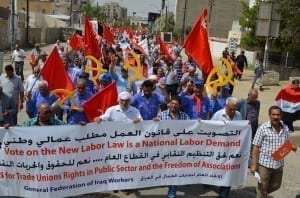
Iraqi union members rally for changes to the country’s Saddam Hussein-era labor code. Credit: Wesam Chaseb Ouda
Union members in Bangladesh, Brazil, Iraq and Morocco were among Solidarity Center allies around the world who rallied, marched in parades and protested in the streets yesterday, marking May Day and the ongoing struggle to ensure workers have a place at the table in the larger global economy and at their workplaces.
In Brazil, UAW President Bob King joined the union Força Sindical at a May Day event with some 1.3 million workers. Iraq workers and their unions marched for passage of a revised law, now under debate in Parliament. Iraqi workers are still covered by a Saddam Hussein-era labor code.
Workers in Morocco celebrated the announcement of a 10 percent boost (over two years) in the minimum wage in the public and private sectors, an action spearheaded by trade unions. The minimum retirement pension also will be boosted, and student grants will increase. Workers say many improvements still must be made, however, and in rallies across the country challenged rising prices and high unemployment and called for social security coverage for all workers and respect for collective and personal freedom.
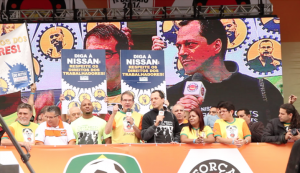
UAW Bob King (center, yellow shirt) joined Força Sindial and 1.3 million workers in Brazil. Credit: Solidarity Center
In Bangladesh, tens of thousands of garment workers turned out in events across the country. At the Jatiya Press Club in Dhaka, the capital, some 12,000 workers gathered, with many forming a human chain. Speaking at one event, Kamrul Hasan, president of Akota Garments Labor Federation, demanded workplace safety so garment workers never again die or become injured from factory fires or collapsed buildings, like Rana Plaza, which pancaked in last April, killing more than 1,110 workers.
In Gazipur, Bangladesh, women made up the majority of the 2,000 garment workers taking part in events sponsored by the Bangladesh Independent Garments Union Federation (BIGUF). Shumi, president of Masco Industries Ltd. (Knit and Composite) Workers Union, said thousands of workers turned out spontaneously this May Day to assert their rights to a union. Other Solidarity Center allies holding events include the National Garments Workers Federation’s (NGWF), the Bangladesh Garments and Industrial Workers Federation’s (BGIWF), the National Garments Workers Federation’s (NGWF) and the Bangladesh Federation of Workers Solidarity (BFWS).
Apr 21, 2014
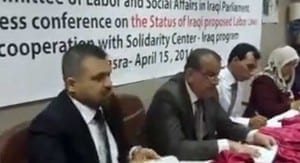
Labor Committee Vice President Salih Al Asady (second from left) speaks at a press conference held by Iraqi unions
Iraqi trade union leaders and members are keeping the spotlight on Parliament, urging lawmakers to pass a trade union law that has been pending since January.
Some 82 unions members and leaders from all Iraqi trade unions, with support from the Solidarity Center, held a press conference in Basra April 15, their latest effort to secure passage of the law. If passed, it would provide first-ever worker rights protections in line with core labor standards, including freedom of association.
In a demonstration of solidarity, the Kurdistan United Workers Union (KUWU) sent two delegates to the event, which also included the head of Parliament’s labor committee.
Union representatives also raised concerns over the scope of the law, which does not cover public-sector workers. Labor Committee Vice President Salih Al Asady, who took part in the event, said he would bring the issue to Parliament. He also urged the Iraqi union leaders and members to continue to show their strength through rallies and other campaign actions to push lawmakers to vote on the law before this session ends. Elections are scheduled April 30, and the current Parliament will remain in session until June 15.
Parliament has voted on 46 of 157 articles, however the remainder have been unable to be voted on due to an insufficient number of members of Parliament showing up to each session, though the law continues to appear each day on the agenda. This is the result of political conflicts, in particular around the inability of the parliament to pass the budget law.
Six major Iraqi labor unions, together with the Solidarity Center, have worked since June 2012 to bring proposed changes to the nation’s draft labor law in line with International Labor Organization (ILO) conventions. Workers are still subject to labor laws from the Saddam Hussein era.
Watch a video of the event (in Arabic).
Jan 22, 2014
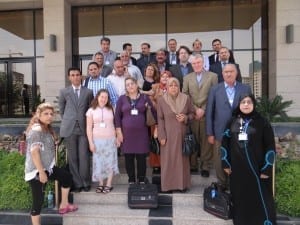
Iraqi union leaders and Solidarity Center staff last May. Credit: Solidarity Center
Update: The draft version of Iraq’s new labor law emerged from Parliament in recent days but falls far short of protecting workers freedom to collectively bargain, according to Iraqi union leaders.
On Friday, Iraqi union leaders expressed their concerns to members of Parliament at a Solidarity Center-sponsored conference, and union leaders have written a letter to the Speaker of Parliament in which they detail the proposed law’s shortcomings. Read the letter in English and Arabic. The AFL-CIO also has written to the Speaker of Parliament expressing “deep disappointment” that the proposed legislation “contains several provisions that violate international standards.” Read the AFL-CIO letter.
January 10, 2014—The Iraqi Parliament is currently debating legislation that for the first time could contain worker rights protections in line with core labor standards, including freedom of association. The law would replace the 1987 labor law passed by Saddam Hussein’s regime.
The vote comes nearly a decade after the Inetrnational Labor Organization (ILO) first worked with the government of Iraq to draft new legislation. The ILO commented on drafts in 2007 and 2012, finding them severely inadequate in regards to protecting the rights of workers, in particular freedom of association.
Six major Iraqi labor unions, together with the Solidarity Center, have worked since June 2012 to bring proposed changes to the nation’s draft labor law in line with International Labor Organization (ILO) conventions. In addition, the Solidarity Center facilitated meetings among the unions and the labor committee in parliament, the Iraqi Ministry of Labor and Social Affairs, and the International Trade Union Confederation (ITUC) and the ILO, which provided recommendations based on ILO conventions. The labor federations launched a public advocacy campaign for passage of the labor law, and have received strong support from the global labor movement, including global union federations, the AFL-CIO and the British Trade Union Congress (TUC).
On a parallel front, a new union law that would replace the 1987 Trade Union Law had its first reading in Parliament this week. The 1987 Trade Union Law bans public-sector unions, which include the majority of Iraqi workers, restricts union pluralism and allows government interference in internal union affairs.
The Solidarity Center has worked closely with the Iraqi labor movement to secure passage of the new trade union law that protects freedom of association for all workers. Parliament plans to hold its second reading before the end of January, after which Iraqi unions will advocate for Parliament to vote on it before the current session ends in April.
Sep 18, 2013
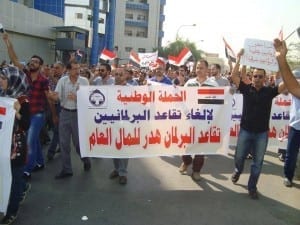
Iraqi workers are demanding better wages and working and living conditions. Credit: Shamkhi Jabour
Iraqi workers and their unions recently took part in nationwide protests to demand better wages and working conditions and improvements in essential services, such as electricity and infrastructure. The General Federation of Iraqi Workers (GFIW) also demanded an end to the exorbitant salaries and pension benefits of government officials, whose compensation offers a sharp contrast with that of millions of workers, who are paid wages so low they cannot support themselves and their families. Workers and their unions say they want a fairer salary scale and increased pensions and social insurance.
When workers took to the streets across Iraq August 31, in some areas, like Nasseryya in the south, governmental security forces and anti-riot police used live bullets to disperse the crowd. In Baghdad, security forces used stun grenades and water cannons on demonstrators and closed roads to prevent people from joining in protest against the Iraq Parliament. Security forces arrested four wounded protestors while they were receiving treatment in the hospital.
Government paralysis, stalled infrastructure improvements and a deteriorating economy have worsened the living and working conditions of most Iraqis. The independent union movement, formed in the wake of Saddam Hussein’s 2003 ouster, continues to push for stronger guarantees in social insurance and health protections for workers and their families, and plays an effective role in calling on the Iraq government to rebuild the country by establishing a strong base for democracy, equality and justice.
Members of the Federation of Workers Councils and Unions in Iraq (FWCUI), the Iraqi Federation of Oil Unions (IFOU), the General Federation of Workers and Unions in Iraq (GFWUI) and other independent unions, such as those representing healthcare workers and engineering professionals, also joined the protests.





